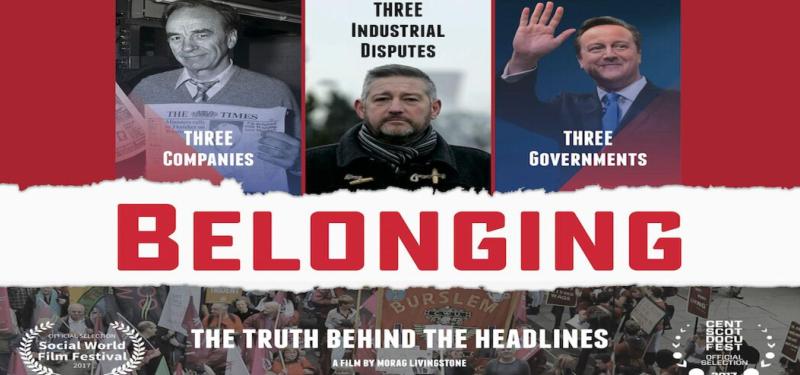
Posted by Sharon Elliott on 21 November 2017
Behind the scenes at the Cinema Museum with BECTU screening of Belonging
The iconic Cinema Museum in south London was packed on Monday night for BECTU’s sold-out screening of an eye-opening documentary, Belonging – the truth behind the headlines.
In her film, director and producer Morag Livingstone uses three UK disputes in three decades to highlight how successive governments, industry, the media and police joined forces to clamp down on the power of trade unions.
It is the first full-length feature documentary by the film maker, writer and photographer, who also chairs the BECTU Writers, Directors and Producers branch.
Works on many levels
The film works on many levels – providing evidence of a concerted effort to destroy the power of unions, telling the stories of individuals caught in the crossfire and showing how trade unions provide the sense of community and “belonging” of the title.
It explores the year-long Wapping print workers’ dispute against News International in 1986-87, after 5,500 workers were sacked for going on strike, and the police violence at Saturday night protests outside the printworks in east London.
It examines the events leading up to it, starting with Rupert Murdoch’s successful purchase of The Times and The Sunday Times in 1981 in the wake of his secret meetings with then prime minister Margaret Thatcher.
The issues at stake are laid bare in a telling quote from Murdoch’s son James – “The only reliable, durable and perpetual guarantor of independence is profit.”
The film moves on to the Communication Workers Union industrial dispute in 2007-08, in support of 12 colleagues suspended from the Burslem sorting office, Stoke-on-Trent, in the run-up to Royal Mail’s privatisation.
Finally, Belonging goes behind the scenes of the high-profile 2013 dispute at the Grangemouth oil Refinery in Scotland, laying bare how Jim Ratcliffe, the billionaire owner of Ineos, which in turn owns Grangemouth, set out to crush the unions there.
Wealth of evidence
Both the personal stories and wider messages are reinforced by a wealth of new evidence uncovered by Morag. She trawled through hundreds of previously classifed documents from government archives made available in 2015 under the 30-year rule.
She made countless Freedom of Information requests (some of them blocked) and got hold of police papers lodged in parliament by the late Labour politician Tony Benn, which showed how far the police exceeded their own guidelines at Wapping.
Her research also uncovered new evidence of the wider Conservative agenda to weaken the unions, still being played out today in the latest anti-union laws.
The showing was followed by questions and answers with Morag and two people in her film – Stevie Deans, Unite vice-convenor at the centre of the Grangemouth dispute and Pat Rafferty, Scottish secretary of Unite. The session was chaired by Mike Dick, sector executive member and activist in the union's Writers Producers and Directors' branch. Noel McClean, now BECTU assistant national secretary but formerly of the CWU, also contributed.
Morag said she was first drawn into making the film after hearing then prime minister David Cameron during parliamentary questions talking about Grangemouth and blaming “a rogue trade unionist” (Stevie Deans) for nearly bringing the Scottish petrochemical industry to its knees.
“I had worked in the oil industry in the past, and knew Cameron had lied,” Morag said, adding that the main change at Grangemouth had been the new owner.
She went into the film with an open mind and the toughest part of making it was “having my whole belief system turned on its head”.
Pat Rafferty thanked Morag for the “the chance to get our history documented”. The film provided a strong lesson in why trade unions should get involved in the arts, he said.
Stevie Deans described how the pressure of the dispute had led him to resign his job, after more than 25 years, and to suffer a mental breakdown. The part in the film where his daughter Ailis describes the impact on her family, and her subsequent disillusionment with politics, is particularly poignant.
He said his interviews with Morag were the first time he had felt able to speak publicly about the issues and his family would be “eternally grateful” for being able to tell their side of the story.
Noel McClean, who represented some of the suspended Burslem members, described the misinformation and lies around the dispute amidst a media narrative “to take the union out”.
Seven years later he had run into a former manager and challenged his account of events in an employment tribunal. The manager had replied: “You know how it is, Noel. You’ve got to do what you do to pay for the shirt on your back.” Noel had replied: “No, it’s about integrity. Plus you are a pawn, you are being used.”
Belonging has just won the “best documentary” award at the Cardiff International Film Festival and is shortlisted at the forthcoming London Labour Film Festival.
* Find out about screenings or buy the DVD, price £9, from http://www.belonging4us.com/THE-FILM-MAKERS.php
- The Cinema Museum is under threat. Please sign the petition to save it.
Comments
Sorry, comments are not currently enabled for this post.

